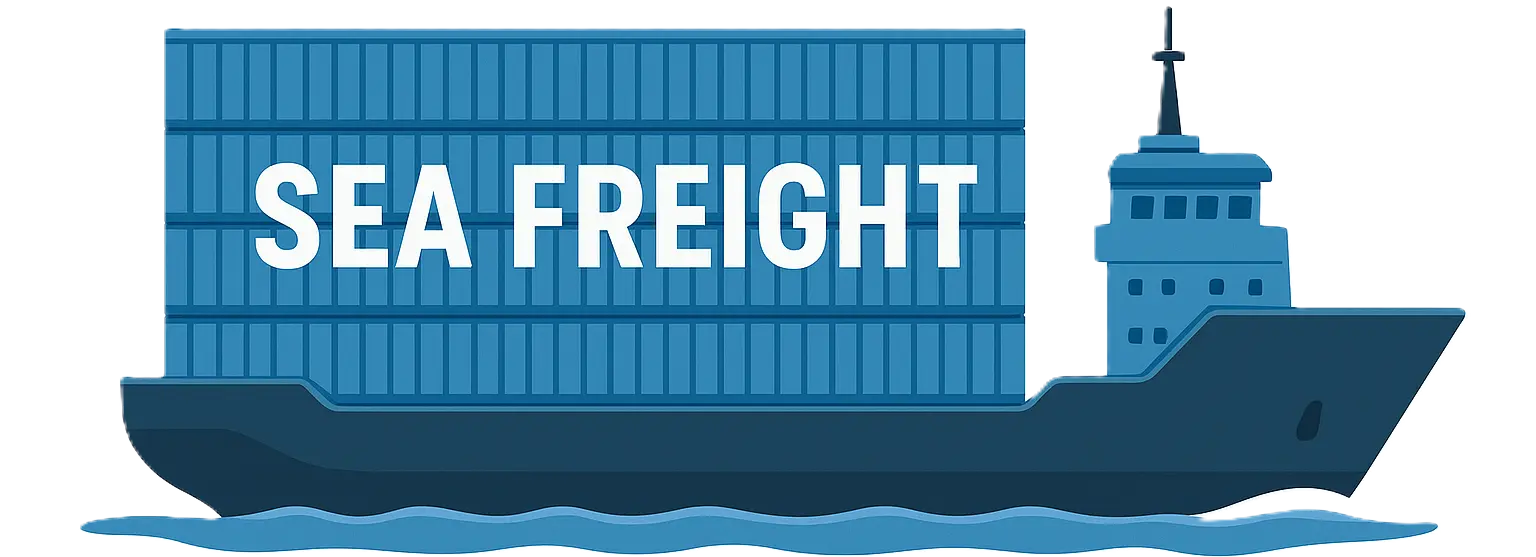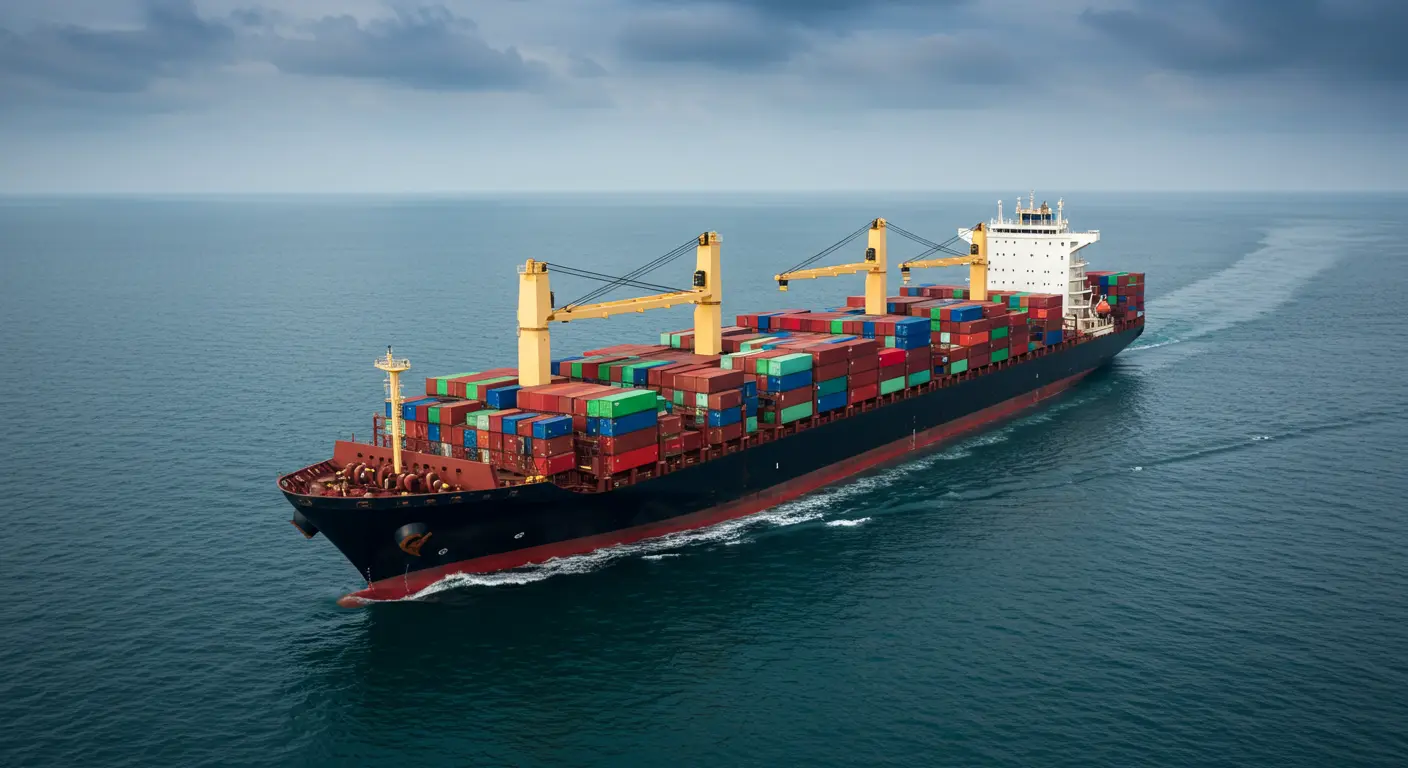
"Sea freight is the optimal solution for transporting large and heavy cargo across continents, and at Elaf Cargo, we have perfected this art. We offer flexible and economical sea freight services, whether you need a Full Container Load (FCL) or a Less-than-Container Load (LCL). In collaboration with a vast network of global shipping lines, we provide regular sailings to all major ports worldwide, with integrated logistics management that includes warehousing, handling, and customs clearance. Our experienced team ensures your goods are in safe hands, meticulously managing every detail of the sea journey to guarantee they arrive safely and on schedule. With Elaf, we cross oceans to bring you to the shores of success."
- Full Container Load (FCL) and Less than Container Load (LCL) services.
- Door-to-door delivery linking international ports to local warehouses.
- Real-time shipment tracking with advanced IT systems.

Sea Freight QA
Here are some common questions about Sea Freight
At "Elaf Cargo," we believe that the strength of our network is the foundation of our success. Therefore, we have built strategic relationships with the largest and most important global shipping lines such as Maersk, CMA CGM, MSC, and Hapag-Lloyd. These partnerships enable us to provide reliable and competitive shipping services worldwide, from China and the United States to Europe and Africa. Whether your shipment is heading to a major port or a remote destination, we guarantee you space on the best sea voyages at preferential rates. Rely on our extensive network to expand your business horizons and access new markets with confidence and ease.
Choosing the right container is a crucial step to ensure the safety of your goods and reduce costs. At "Elaf Cargo," we provide all types of containers to meet various needs. Dry Containers in their different sizes (20 ft, 40 ft, and 40 ft HC) are the most common for general cargo. For goods requiring refrigeration, we offer Reefer Containers to maintain a constant temperature. For non-standard sized shipments, we provide Open Top and Flat Rack containers. Our specialized team will help you choose the ideal container for your shipment.
When it comes to sea freight, there are two main options:
- FCL (Full Container Load): This option is ideal if your goods are sufficient to fill an entire container (20 or 40 feet). FCL offers higher security and faster procedures, as the container is exclusively for your use.
- LCL (Less than Container Load): This means "less than container load." If your goods do not fill an entire container, you can share container space with other shipments. LCL is an economical option for smaller shipments, as you only pay for the space you use.
At "Elaf Cargo," we help you determine the most suitable option based on your shipment size and budget.
Bulk carriers are giant vessels specifically designed to transport unpackaged dry bulk cargo, such as grains, coal, iron ore, and cement. These ships feature large hatches that allow for efficient loading and unloading of enormous quantities of goods. Some of these vessels are equipped with special cranes (geared) to operate in ports lacking advanced infrastructure. This type of shipping is an economical solution for transporting raw materials that form the basis of many industries, as economies of scale significantly reduce transportation costs.
Roll-on/Roll-off (RORO) vessels are ships designed to transport wheeled cargo, such as cars, trucks, buses, and heavy machinery. These vessels feature ramps that allow vehicles to be driven directly onto the ship and secured, then driven off upon arrival. This method makes the loading and unloading process extremely fast and efficient compared to using cranes. At "Elaf Cargo," we provide reliable RORO shipping solutions to transport your vehicles and machinery safely to their global destinations, making it the ideal choice for car manufacturers and contractors.
Container vessels are the most common type in the shipping world today, transporting the vast majority of manufactured goods globally. These ships are designed to carry thousands of standard containers (TEU), facilitating standardized transportation between ports, trucks, and trains. Some modern vessels, such as the (ULCVs) class, have a capacity exceeding 20,000 containers. At "Elaf Cargo," we rely on these vessels to provide regular and reliable shipping services on major shipping routes, ensuring your containerized goods arrive safely and efficiently.
To get the best price for your sea shipment, whether it's a full container load (FCL) or a less than container load (LCL), providing us with accurate information is essential. We need to know the Port of Loading (POL) and Port of Destination (POD). For FCL, the type and size of the required container must be specified. For LCL, we need the weight and dimensions of the shipment to calculate the volume (CBM). Additionally, it's important to specify the nature of the goods to ensure compliance with regulations, and the shipment ready date to book the most suitable sea voyage. This information enables us to provide an accurate quote that meets your needs.
It's important to understand these charges to avoid unexpected costs:
- Demurrage: These are charges imposed by the shipping line if a container remains at the port for longer than the allowed free time. They are calculated daily after the free period ends until the container is moved out of the port.
- Detention: These are charges imposed by shipping lines if the importer retains an empty container outside the port for longer than the allowed free time for its return.
At "Elaf Cargo," we work with you to expedite clearance and delivery processes to avoid these charges as much as possible.
In Less than Container Load (LCL) sea freight, the cost primarily depends on the shipment's volume, measured in Cubic Meters (CBM). Calculating the shipment's volume is simple and straightforward. All you need to do is measure the dimensions of the package (or packages) in meters, then apply the following formula: Length (m) × Width (m) × Height (m) = CBM. If you have multiple packages, calculate the volume of each package separately and then sum the results. This number determines the space your goods will occupy in the shared container, and thus the shipping cost. Our team at "Elaf Cargo" is ready to help you accurately calculate your shipment's volume.
These two terms define key locations in the shipping process:
- Container Yard (CY): This is a designated area within the port for storing full container loads (FCL) before they are loaded onto vessels or after they are unloaded. In CY/CY shipments, the shipper is responsible for loading the container, and the consignee is responsible for unloading it.
- Container Freight Station (CFS): This is a warehouse (often just outside the port) where Less than Container Load (LCL) shipments from multiple clients are consolidated into one container, or where they are deconsolidated and distributed. In CFS/CFS shipments, the freight forwarder is responsible for consolidating and deconsolidating the goods.
Not all goods can be placed in a standard shipping container. Oversized or heavy shipments, such as large machinery, industrial equipment, or project components, require a specialized solution known as "Break Bulk." In this type of shipping, cargo is loaded directly onto the vessel as individual pieces instead of being placed in a container. This process requires meticulous planning and specialized lifting and handling equipment. At "Elaf Cargo," we have expertise in managing complex Break Bulk shipments, ensuring we find the right vessel and coordinate the loading and unloading process safely and efficiently.